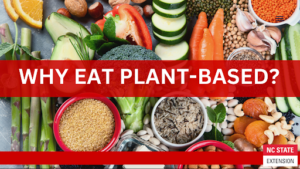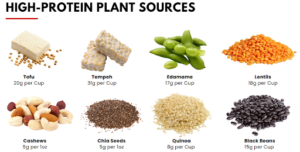Plant-Based Eating
go.ncsu.edu/readext?1083167
en Español / em Português
El inglés es el idioma de control de esta página. En la medida en que haya algún conflicto entre la traducción al inglés y la traducción, el inglés prevalece.
Al hacer clic en el enlace de traducción se activa un servicio de traducción gratuito para convertir la página al español. Al igual que con cualquier traducción por Internet, la conversión no es sensible al contexto y puede que no traduzca el texto en su significado original. NC State Extension no garantiza la exactitud del texto traducido. Por favor, tenga en cuenta que algunas aplicaciones y/o servicios pueden no funcionar como se espera cuando se traducen.
Português
Inglês é o idioma de controle desta página. Na medida que haja algum conflito entre o texto original em Inglês e a tradução, o Inglês prevalece.
Ao clicar no link de tradução, um serviço gratuito de tradução será ativado para converter a página para o Português. Como em qualquer tradução pela internet, a conversão não é sensivel ao contexto e pode não ocorrer a tradução para o significado orginal. O serviço de Extensão da Carolina do Norte (NC State Extension) não garante a exatidão do texto traduzido. Por favor, observe que algumas funções ou serviços podem não funcionar como esperado após a tradução.
English
English is the controlling language of this page. To the extent there is any conflict between the English text and the translation, English controls.
Clicking on the translation link activates a free translation service to convert the page to Spanish. As with any Internet translation, the conversion is not context-sensitive and may not translate the text to its original meaning. NC State Extension does not guarantee the accuracy of the translated text. Please note that some applications and/or services may not function as expected when translated.
Collapse ▲ I recently was able to participate in a continuing education program with our
I recently was able to participate in a continuing education program with our
Extension Master Food Volunteers from North Carolina Cooperative Extension.
The topic was “Plant-based Made Easy”.
This training was conducted by Sara Roscoe, M.Ed. the Family and Consumer Science (FCS) Extension Agent in Alamance County and Demetria Cox-Thomas, MS, RDN, LDN the FCS Agent from Mecklenburg County. Both have been eating “plant-based” for several years. They shared their experiences, knowledge and expertise with the group.
They started with the question—what does plant-based eating mean?
Plant-based eating is really an umbrella term for diets that emphasize eating
foods derived from plants and exclude or limit eating animal products. There are
six basic types of plant-based diets:
Vegan- is a person who eats no red meat, poultry, fish, eggs or dairy products.
In some cases, they also do not eat honey because it is made by bees.
Lacto-vegetarian- is a person who eats no red meat, poultry, fish or eggs—but
does eat dairy products such as milk, yogurt and cheeses.
Ovo-vegetarian- does not eat red meat, poultry, fish or dairy but does eat eggs.
Lacto-ovo-vegetarian—does not eat red meat or poultry or fish, but do eat eggs
and dairy products.
Pesco-vegetarian- does not eat red meat or poultry, but does eat fish, eggs and
dairy products.
Flexitarian- this is a person who is primarily plant-based but will eat other foods
occasionally.
One key thing that the Extension Agents emphasized was that just because
someone is eating plant-based does not automatically mean they are eating
healthy. There can be unhealthful plant-based diets that are full of foods such as
fruit juices, sugar sweetened beverages, refined grains, potatoes and sweets.
Healthful plant-based diet should be high in fruits, vegetables, legumes, whole
grains, nuts and unsaturated vegetable oils. They typically include low-to-no
animal products (meat, fish, poultry, dairy and eggs) and very limited in
processed foods. Eating plant-based does not necessarily require (or is it
recommend) that someone only eat specially developed/processed foods such
as plant-based/veggie burgers, meatballs and sausages.
They also discussed why would someone want to eat plant-based diets. Some
obvious responses include health related concerns. Because plant-based diets
are naturally lower in calories they can be good for weight management. People
with Type 2 diabetes can benefit from plant-based eating because increased fiber
and whole grains help manage diabetes. They can also be beneficial for those
with cardio-vascular disease because plant-based diets are lower in saturated
fats.
While this all sounds good, there are also some barriers. It may be difficult for
some people go completely plant-based because they enjoy eating meat. Some
folks just don’t like vegetables and consider them bland in flavor—this can be
changed by looking at cooking methods and adding herbs and spices. Others
think that it may also be too expensive. But not necessarily so, because you’re
swapping out plant-based protein for high-cost animal protein.

Overall eating plant-based does require some extra planning and effort. You’ll
need access to quality produce and meal planning, food preparation equipment
and cooking skills.
Nutritionally, plant-based diets offer all the nutrients needed for optimal health.
People eating plant-based diets tend to consume less protein that meat eaters.
However, most plant foods contain some protein with the highest amount found
in legumes, soy foods, nuts and seeds.
Thinking of going plant-based but not ready to go all the way? You can transition
into it gradually. Some ideas are to think of meat as a side dish and not the main
dish. Use smaller amounts of meat in recipes but keeping a little as the “flavoring”. This can help to decrease the amount of meat you eat and will help keep your grocery costs down. While you’re doing this, add more plant foods in your diet.
Another suggestion is to add more plants to dishes that you already are eating.
Try adding beans, corn, herbs and avocados to chicken enchiladas. Or add nuts
or seeds and leftover cooked whole grains to green leafy salads instead of
animal protein.
A good way to start eating more plant-based is to give it a try once a week. Try
Fish Fridays, Meatless Mondays or Salmon Saturdays. Over time this can make
a difference.
If you’d like more details on this topic, you can view the recording of this program
at this link: Plant Based Made Easy: Boosting Extension Programming with Simple Recipes
Continuing education sessions are offered monthly to Extension Master Food
Volunteers, sharing research and evidence-based information about timely and
trending topics. If you are interested in learning more about becoming an EMFV,
please reach out to myself or Avery Ashley at the N.C. Cooperative Extension
Brunswick County Center.
Syracuse is a Family and Consumer Science team member and can be reached at
clsyracu@ncsu.edu or at N.C. Cooperative Extension,
Brunswick County Center 910-253-2610.



